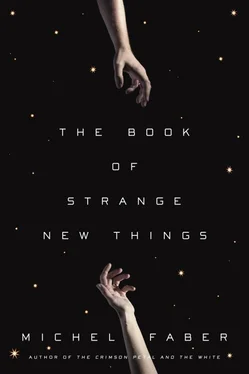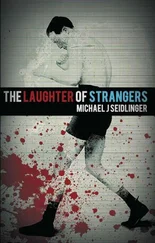He threw the dishdasha over his head and allowed the cool fabric to slide across his skin, sheathing his nakedness. Turning to appraise his reflection in the window, he confirmed that Bea had chosen well. The thing fitted him, as though a tailor in the Middle East had measured his shoulders, cut the cloth and sewn it for him specially.
The window he’d been using as a mirror became a window again, as lights flared up outside. Two glowing points, like the eyes of some monstrous organism approaching. He stepped closer to the glass and peered through, but the vehicle’s headlights disappeared just as he recognised them for what they were.
6. His whole life had been leading up to this
A rendezvous between a married man and a female stranger, each of them far from home, in the obscure hours before dawn. If there was anything improper or potentially complicated about that, Peter didn’t waste energy worrying over it. He and Grainger both had jobs to do, and God was watching.
Besides, Grainger’s reaction to him, when he opened the door to her knock, was hardly encouraging. She did a double-take: a classic cartoon-style double-take. Her head jerked so hard he thought she might teeter backwards into the corridor, but she just swayed on her feet and stared. The provocation, of course, was the big inky cross on his chest. Seeing it through her eyes, he was suddenly embarrassed.
‘I took your advice,’ he tried to joke, plucking at the sleeves of the dishdasha. ‘About the denim jacket.’
She didn’t smile, just stared some more.
‘You could’ve gone to, like, a T-shirt place,’ she said at last, ‘and got that done… uh… professionally.’ Her own attire was unchanged since their first meeting: still the white smock, cotton slacks, and headscarf. Not conventional Western dress, by any means, yet somehow, on her, it looked more natural, less affected, than his own get-up.
‘The cross was… an accident,’ he explained. ‘A bunch of ink pens exploded.’
‘Uh… OK,’ she said. ‘Well, I guess it gives… kind of a homespun impression. Amateur — in a good way.’
This condescending gesture of diplomacy made him smile. ‘You think I look like a ponce.’
‘A what?’
‘A poseur.’
She glanced down the corridor, towards the exit. ‘Not for me to say. You ready?’
Side by side they walked out of the building, into the darkness. The warm air embraced them with balmy enthusiasm and Peter instantly felt less self-conscious about his outfit, as it was perfect for the climate. Transporting his old clothes all the way to Oasis had been pointless, he appreciated that now. He must reinvent himself, and this morning was a good time to begin.
Grainger’s vehicle was parked right next to the compound, illuminated by a lamp jutting from the concrete façade. It was a big, military-looking thing, clearly much more powerful than the frugal little runabout Peter and Bea owned.
‘I really appreciate you making a car available for me,’ said Peter. ‘I imagine you have to ration them. The fuel and so on.’
‘Best to keep ’em in use,’ said Grainger. ‘They go to hell otherwise. Technically speaking. The moisture’s a killer. Let me show you something.’
She stepped up to the vehicle and flipped open the hatch to show him the engine. Peter dutifully leaned over and looked, although he knew nothing about the inner workings of cars, hadn’t even mastered such basics as Bea could manage, like topping up oil, applying anti-freeze or attaching jump leads. Even so, he could tell that there was something unusual here.
‘It’s… disgusting,’ he said, and laughed at his own tactlessness. But it was true: the whole engine was caked in a greasy gunk that stank like old cat food.
‘Sure,’ said Grainger, ‘but I hope you understand this isn’t damage, this is the cure. The prevention.’
‘Oh.’
She pushed the hatch down with just the right amount of force to make it snap shut. ‘Takes a full hour to grease up a vehicle like this. Do a few of ’em and you stink for the whole day.’
Instinctively, he tried to smell her, or at least retrieve a memory of how she’d smelled before they stepped out into the muggy air. She smelled neutral. Nice, even.
‘Is that one of your jobs? Greasing up the cars?’
She motioned him to get in. ‘We all get grease duty sometimes.’
‘Very democratic. Nobody complains?’
‘This is not the place for complainers,’ she said, swinging into the driver’s seat.
He opened the passenger door and joined her inside. No sooner had his body settled into position than she switched on the ignition and got the motor revving.
‘What about the people at the top?’ he asked. ‘Do they get grease duty too?’
‘People at the top?’
‘The… administration. Managers. Whatever you call them here.’
Grainger blinked, as though she’d been asked a question about lion tamers or circus clowns. ‘We don’t really have managers,’ she said, as she steered the vehicle and got into gear. ‘We all pitch in, take turns. It’s pretty obvious what needs to be done. If there’s any disagreement, we vote. Mostly we just follow the USIC guidelines.’
‘Sounds too good to be true.’
‘Too good to be true?’ Grainger shook her head. ‘No offence, but that’s what some people might say about religion. Not about a simple duty roster for keeping your vehicles’ engines from corroding.’
The rhetoric was neat, but something in Grainger’s tone of voice made Peter suspect that she didn’t quite believe it. He had a pretty good radar for the doubts that people hid beneath bravado.
‘But there must be someone,’ he insisted, ‘who takes responsibility for the project as a whole?’
‘Sure,’ she said. The car was picking up speed now and the lights of the compound rapidly receded into the gloom. ‘But they’re a long way away. Can’t expect them to hold our hands, can we?’
As they drove through the dark towards the invisible horizon, they munched on raisin bread. Grainger had positioned a big fresh loaf of it in the gap between the front seats, propped up against the gearstick, and they each helped themselves to slice after slice.
‘This is good,’ he said.
‘It’s made here,’ she said, with a hint of pride.
‘Including the raisins?’
‘No, not the raisins. Or the egg. But the flour and the shortening and the sweetener and the sodium bicarbonate are. And the loaves are baked here. We have a bakery.’
‘Very nice.’ He munched some more, swallowed. They’d left the base perimeter fifteen minutes ago. Nothing remarkable had happened yet. There was little to be seen in the vehicle’s headlight beam, which was the only light for miles around. Not for the first time, Peter thought about how much of our lives we spend sequestered inside small patches of electric brightness, blind to everything beyond the reach of those fragile bulbs.
‘When is sunrise?’ he asked.
‘In about three, four hours,’ she said. ‘Or maybe two, I’m not sure, don’t quote me. It’s a gradual process. Not so dramatic.’
They were driving straight over raw, uncultivated ground. There was no road or track or any evidence that anyone had ever driven or walked here before, although Grainger assured him that she made this trip regularly. In the absence of tracks or lights, it was sometimes difficult to believe they were moving, despite the gentle vibration of the vehicle’s chassis. The view in every direction was the same. Grainger would occasionally glance at the dashboard’s computerised navigation system, which kept her informed when they were about to stray from the correct course.
The landscape — what little Peter could see of it in the dark — was surprisingly bare given the climate. The earth was chocolate-brown, and so densely compacted that the tyres travelled smoothly across it with no jolts to the suspension. Here and there, the terrain was spotted with patches of white mushroom, or speckled with a haze of greenish stuff that might be moss. No trees, no bushes, not even any grass. A dark, moist tundra.
Читать дальше












